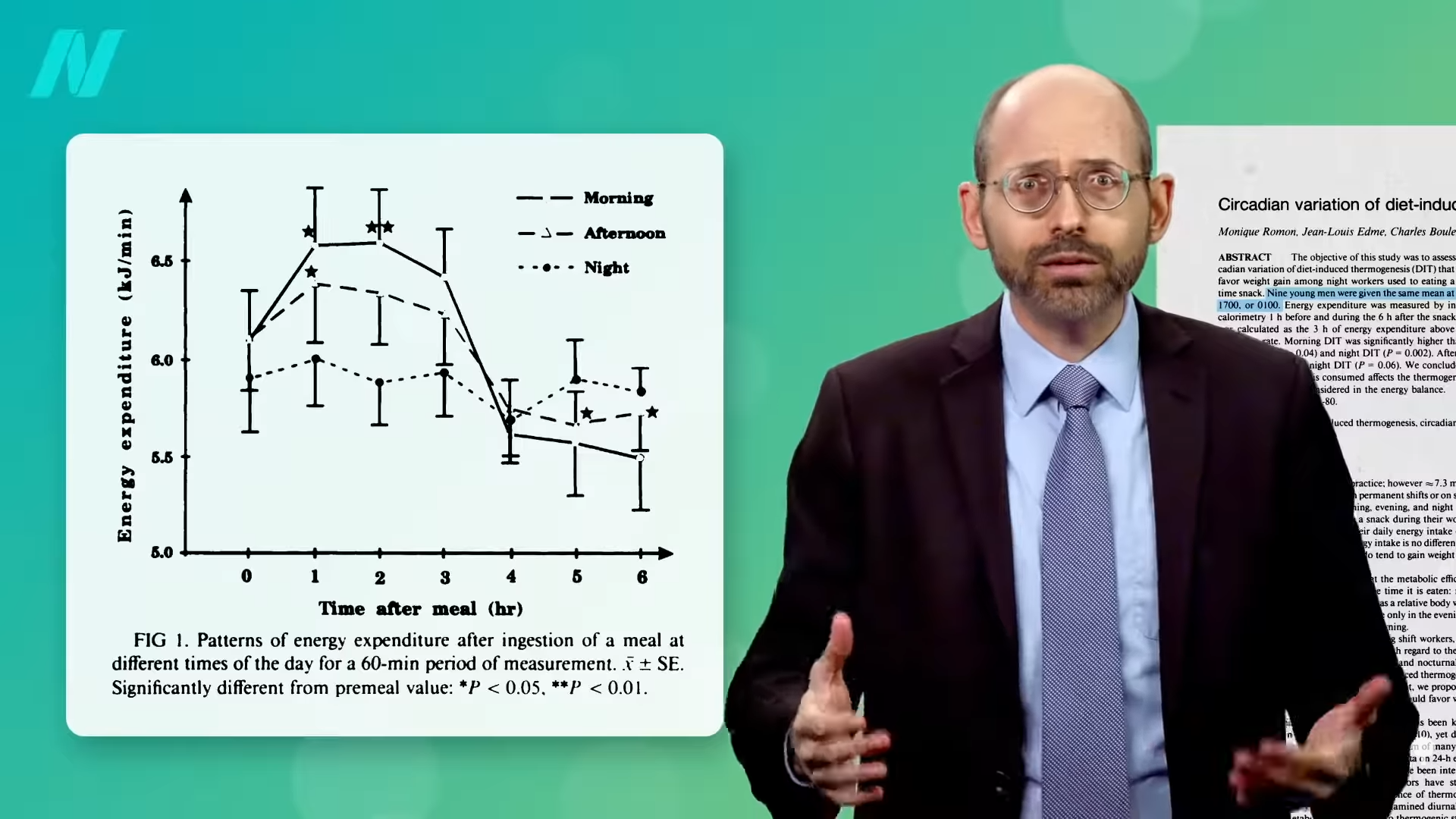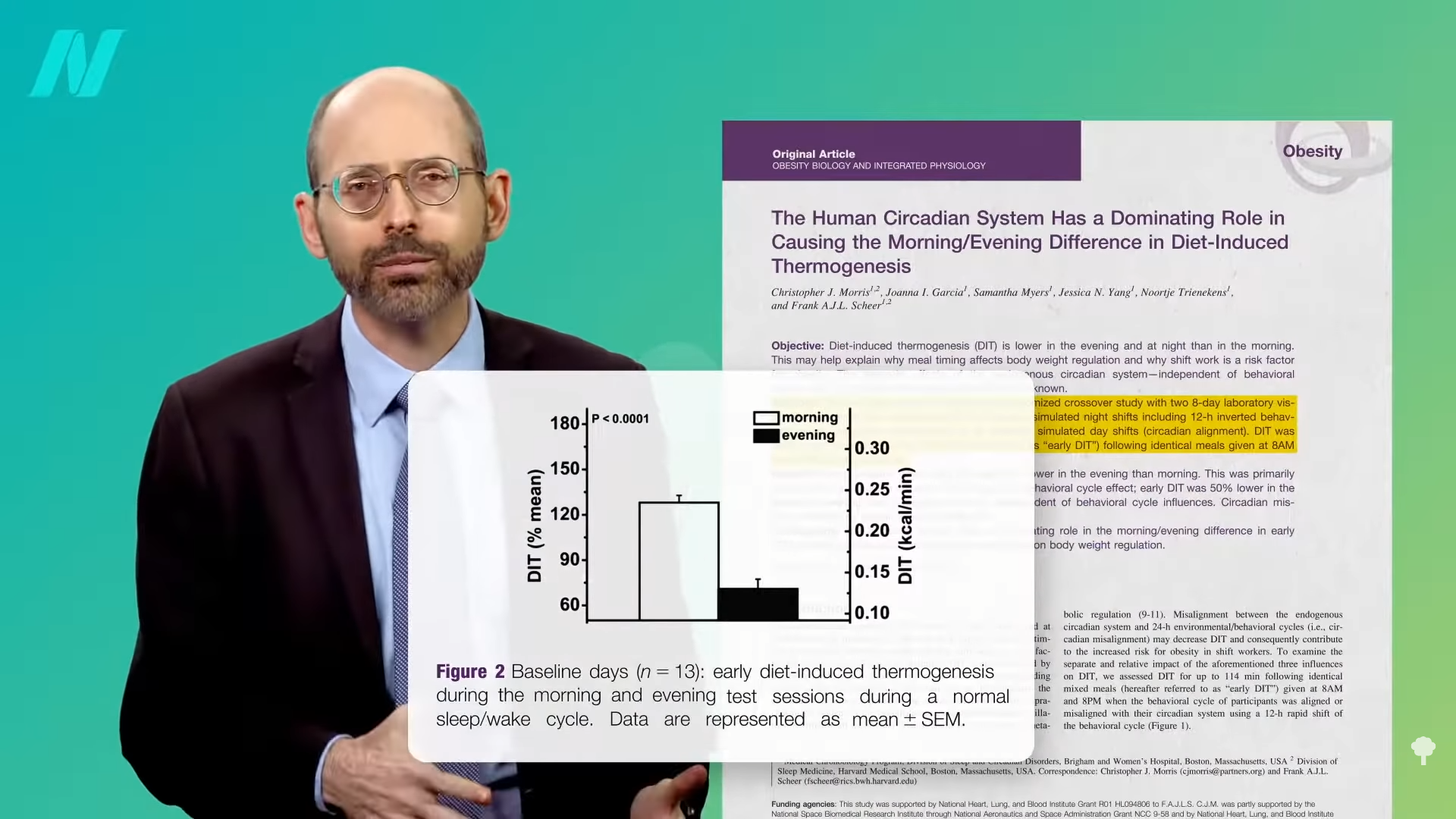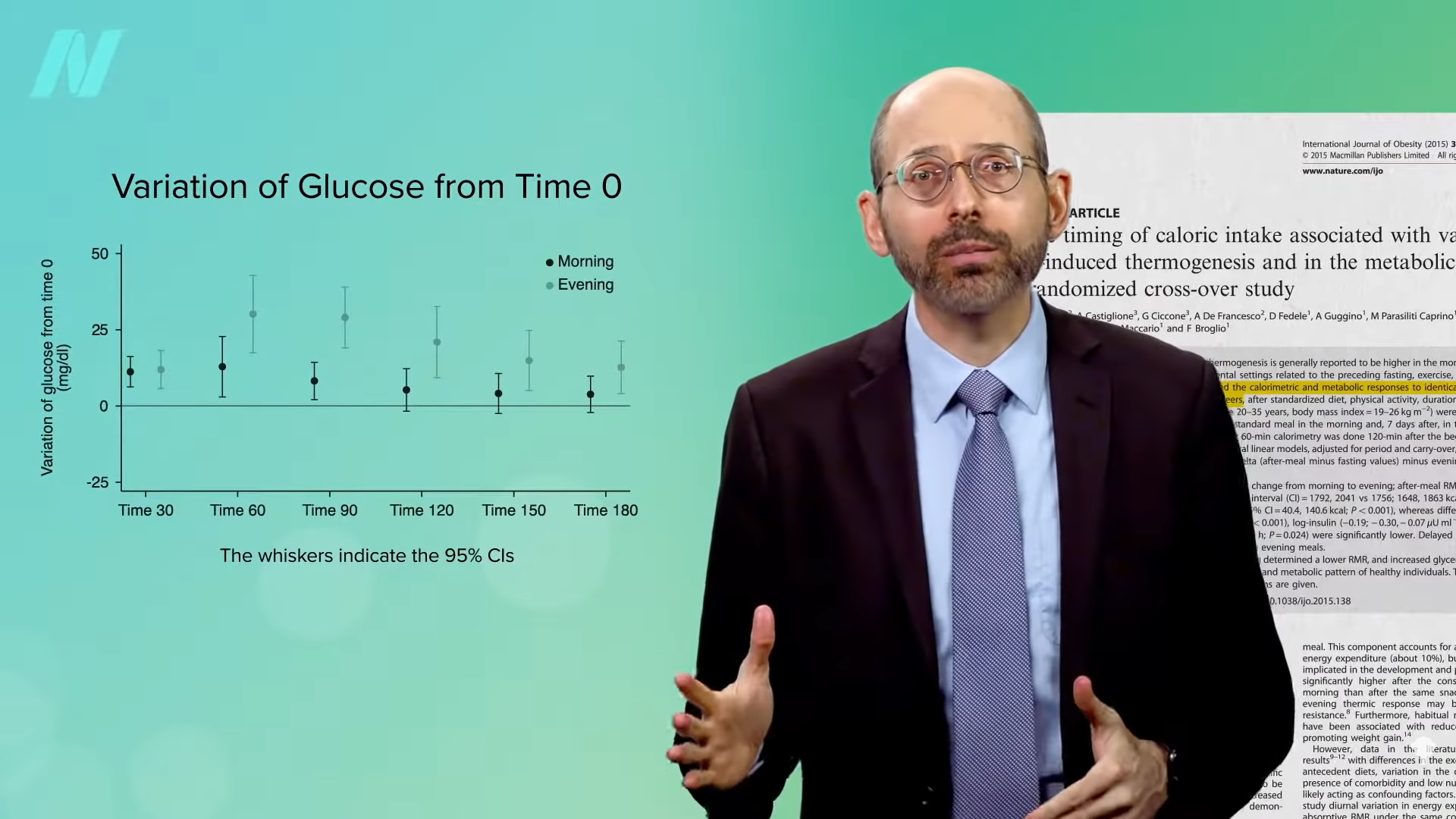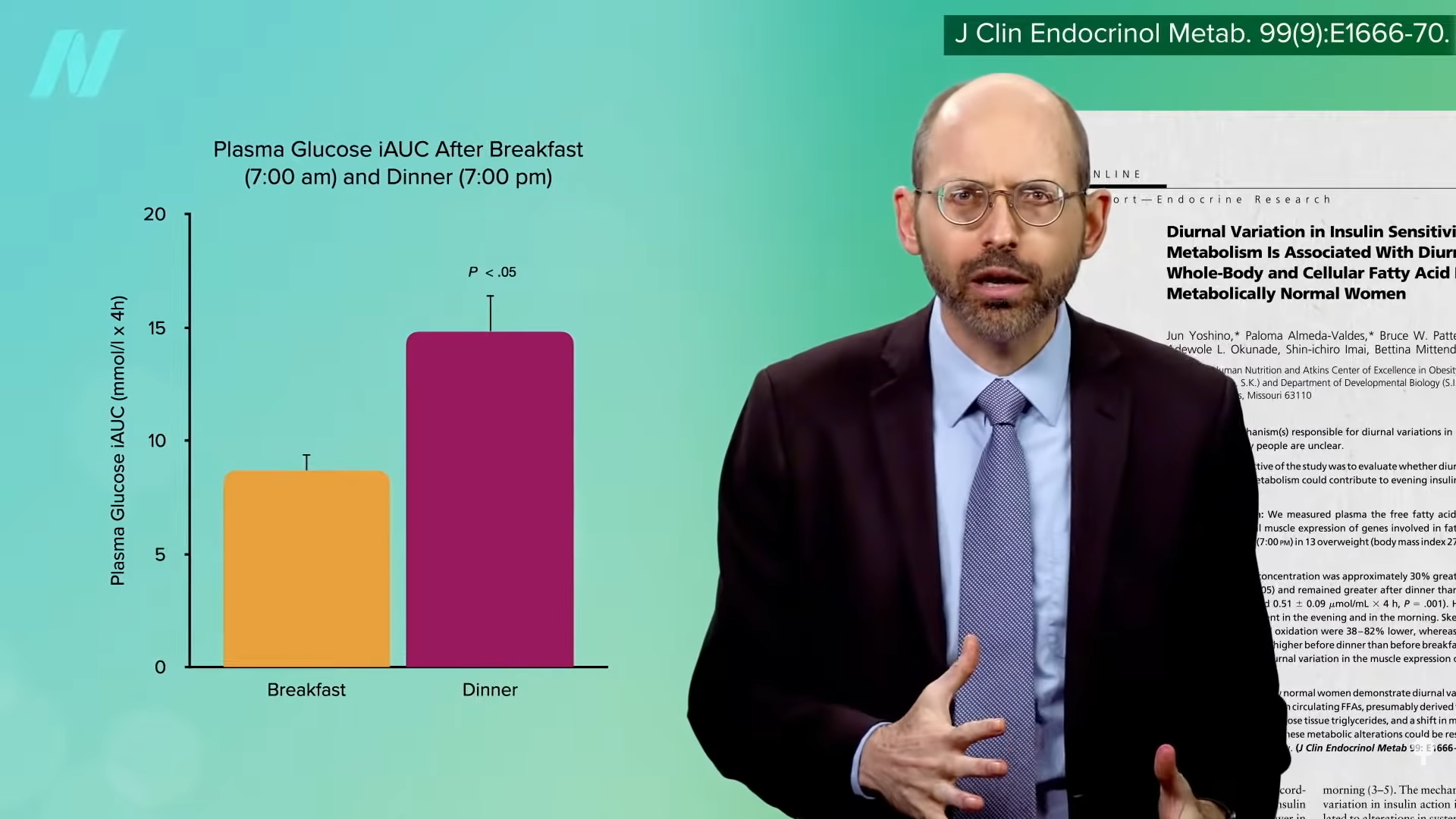[ad_1]
Why are calories eaten in the morning less fattening than calories eaten in the evening?
One reason calories consumed in the morning are less fattening than those eaten in the evening is that more calories are burned off in the morning due to diet-induced thermogenesis. That’s the amount of energy the body takes to digest and process a meal, given off in part as waste heat. If people are given the same meal in the morning, afternoon, or night, their body uses up about 25 percent more calories to process it in the afternoon than at night and about 50 percent more calories to digest it in the morning, as you can see below and at 0:36 in my video Eat More Calories in the Morning Than the Evening. That leaves fewer net calories in the morning to be stored as fat.

Let’s put some actual numbers to it. A group of Italian researchers randomized 20 people to eat the same standardized meal at either 8:00 am or 8:00 pm and had them return a week later to do the opposite. So, each person had a chance to eat the same meal for breakfast and dinner. After every meal, the study participants were placed in a “calorimeter” contraption to precisely measure how many calories they were burning over the next three hours. As you can see below and at 1:18 in my video, the researchers calculated that the meal given in the morning took about 300 calories to digest, whereas the same meal given at night only used up about 200 calories to process. The meal was about 1,200 calories, but, when eaten in the morning, it ended up only providing about 900 calories compared to more like 1,000 calories at night. Same meal, same food, same amount of food, but effectively 100 fewer calories when consumed in the morning rather than at night. So, a calorie is not just a calorie. It depends on when we eat it.

But why do we burn more calories when eating a morning meal? Is it behavioral or biological? If you started working the graveyard shift, sleeping during the day and working all night, which meal would net you fewer calories? Would it be the “breakfast” you had at night before you went to work or the “dinner” you had in the morning before you went to bed? In other words, is it something about eating before you go to sleep that causes your body to hold onto more calories, or is it built into our circadian rhythm, where we store more calories at night regardless of what we’re doing? You don’t know until you put it to the test.
Harvard researchers randomized people to identical meals at 8:00 am versus 8:00 pm while under simulated night shifts or day shifts. Regardless of activity level or sleeping cycle, the number of calories that were burned processing the morning meals was 50 percent higher than in the evening, as you can see in the graph below and at 2:45 in my video. So, the difference is explained by chronobiology: It’s just part of our circadian rhythm to burn more meal calories in the morning. But, why? What exactly is going on?

How does it make sense for our body to waste calories in the morning when we have the whole day ahead of us?
Our body isn’t so much wasting calories as investing them. When we eat in the morning, our body bulks up our muscles with glycogen, which is the primary energy reserve our body uses to fuel our muscles, but this takes energy. In the evening, our body expects to be sleeping for much of the next 12 hours, so rather than storing blood sugar as extra glycogen in our muscles, it preferentially uses it as an energy source, which may end up meaning we burn less of our backup fuel (body fat). In the morning, however, our body expects to be running around all day, so instead of just burning off breakfast, our body continues to dip into its fat stores while we use breakfast calories to stuff our muscles full of the energy reserves we need to move around over the day. That’s where the “inefficiency” may come from. The reason it costs more calories to process a morning meal is that, instead of just burning glucose (blood sugar) directly, our body uses up energy to string glucose molecules together into chains of glycogen in our muscles, which are then just going to be broken back down into glucose later in the day. That extra assembly/disassembly step takes energy—energy that our body takes out from the meal, leaving us with fewer calories.
So, in the morning, our muscles are especially sensitive to insulin, rapidly pulling blood sugar out of our bloodstream to build up glycogen reserves. At night, though, our muscles become relatively insulin-resistant and resist the signal to take in extra blood sugar. So, does that mean you get a higher blood sugar and insulin spike in the evening compared to eating the same meal in the morning? Yes. As you can see in the graph below and at 5:02 in my video, in that 100-calorie-difference study, for example, blood sugars rose twice as high after the 8:00 pm meal compared to the same meal eaten in the morning.

So, shifting the bulk of our caloric intake towards the morning would appear to have a dual benefit—more weight loss, and better blood sugar control, as shown in the graph below and at 5:12 in my video.

If you thought dual benefits sounded good, stay tuned for triple benefits! I dive deeper into circadian rhythms. See related posts below.
My last few videos (see below) focus on why science points to loading your calories towards the beginning of the day.
Click here to get Elevating Book Publishing at discounted price while it’s still available…
[ad_2]


7 Comments
Thank you for your sharing. I am worried that I lack creative ideas. It is your article that makes me full of hope. Thank you. But, I have a question, can you help me?
Your article helped me a lot, is there any more related content? Thanks! 免费gate账户
Anyone else struggling with the phdream11login? Seems they had some server issues lately. Hopefully, it’s all sorted now and the games are running smoothly.
123betno1? No. 1 katanya? Buktikan dulu dong! Mau coba pasang bola ah malam ini. 123betno1
Having trouble accessing bet188? Try using bet188alternatif. It’s a good alternative if you’re experiencing issues. Hope it helps you log in smoothly. bet188alternatif
Heard some buzz about 88gobet8. Thinking of checking it out for some weekend fun. The layout looks promising. Thoughts? Join me 88gobet8, let’s have some fun!
Gamebet3 is alright. Not the flashiest site, but it gets the job done. Decent odds, nothing too crazy. Worth a look if you’re shopping around. gamebet3